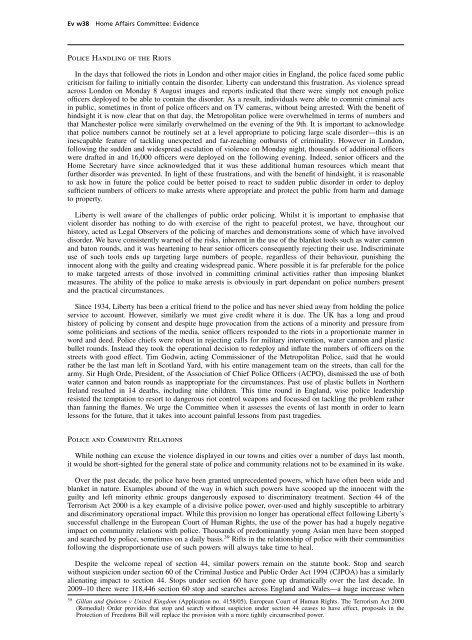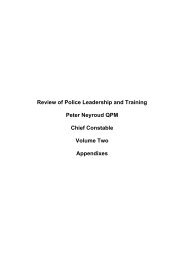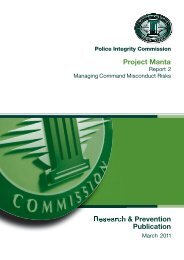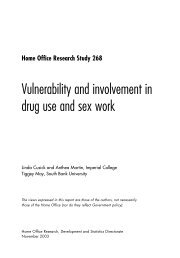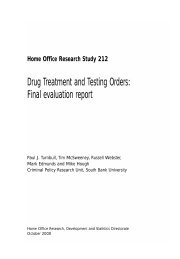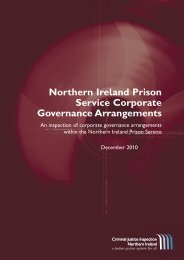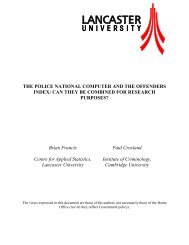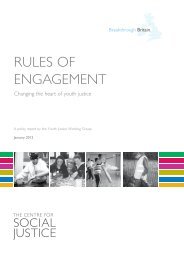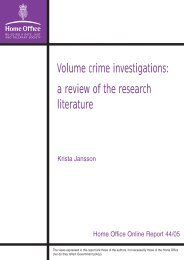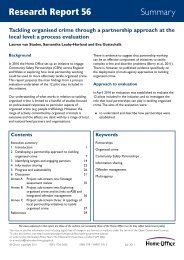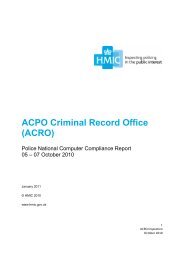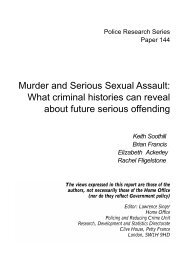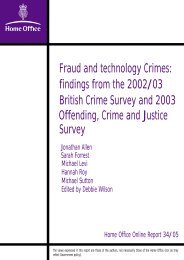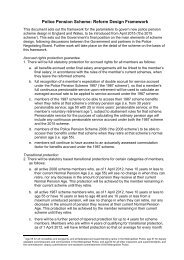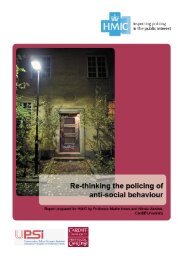Policing Large Scale Disorder: Lessons from the disturbances of ...
Policing Large Scale Disorder: Lessons from the disturbances of ...
Policing Large Scale Disorder: Lessons from the disturbances of ...
Create successful ePaper yourself
Turn your PDF publications into a flip-book with our unique Google optimized e-Paper software.
Ev w38 Home Affairs Committee: Evidence<br />
Police Handling <strong>of</strong> <strong>the</strong> Riots<br />
In <strong>the</strong> days that followed <strong>the</strong> riots in London and o<strong>the</strong>r major cities in England, <strong>the</strong> police faced some public<br />
criticism for failing to initially contain <strong>the</strong> disorder. Liberty can understand this frustration. As violence spread<br />
across London on Monday 8 August images and reports indicated that <strong>the</strong>re were simply not enough police<br />
<strong>of</strong>ficers deployed to be able to contain <strong>the</strong> disorder. As a result, individuals were able to commit criminal acts<br />
in public, sometimes in front <strong>of</strong> police <strong>of</strong>ficers and on TV cameras, without being arrested. With <strong>the</strong> benefit <strong>of</strong><br />
hindsight it is now clear that on that day, <strong>the</strong> Metropolitan police were overwhelmed in terms <strong>of</strong> numbers and<br />
that Manchester police were similarly overwhelmed on <strong>the</strong> evening <strong>of</strong> <strong>the</strong> 9th. It is important to acknowledge<br />
that police numbers cannot be routinely set at a level appropriate to policing large scale disorder—this is an<br />
inescapable feature <strong>of</strong> tackling unexpected and far-reaching outbursts <strong>of</strong> criminality. However in London,<br />
following <strong>the</strong> sudden and widespread escalation <strong>of</strong> violence on Monday night, thousands <strong>of</strong> additional <strong>of</strong>ficers<br />
were drafted in and 16,000 <strong>of</strong>ficers were deployed on <strong>the</strong> following evening. Indeed, senior <strong>of</strong>ficers and <strong>the</strong><br />
Home Secretary have since acknowledged that it was <strong>the</strong>se additional human resources which meant that<br />
fur<strong>the</strong>r disorder was prevented. In light <strong>of</strong> <strong>the</strong>se frustrations, and with <strong>the</strong> benefit <strong>of</strong> hindsight, it is reasonable<br />
to ask how in future <strong>the</strong> police could be better poised to react to sudden public disorder in order to deploy<br />
sufficient numbers <strong>of</strong> <strong>of</strong>ficers to make arrests where appropriate and protect <strong>the</strong> public <strong>from</strong> harm and damage<br />
to property.<br />
Liberty is well aware <strong>of</strong> <strong>the</strong> challenges <strong>of</strong> public order policing. Whilst it is important to emphasise that<br />
violent disorder has nothing to do with exercise <strong>of</strong> <strong>the</strong> right to peaceful protest, we have, throughout our<br />
history, acted as Legal Observers <strong>of</strong> <strong>the</strong> policing <strong>of</strong> marches and demonstrations some <strong>of</strong> which have involved<br />
disorder. We have consistently warned <strong>of</strong> <strong>the</strong> risks, inherent in <strong>the</strong> use <strong>of</strong> <strong>the</strong> blanket tools such as water cannon<br />
and baton rounds, and it was heartening to hear senior <strong>of</strong>ficers consequently rejecting <strong>the</strong>ir use. Indiscriminate<br />
use <strong>of</strong> such tools ends up targeting large numbers <strong>of</strong> people, regardless <strong>of</strong> <strong>the</strong>ir behaviour, punishing <strong>the</strong><br />
innocent along with <strong>the</strong> guilty and creating widespread panic. Where possible it is far preferable for <strong>the</strong> police<br />
to make targeted arrests <strong>of</strong> those involved in committing criminal activities ra<strong>the</strong>r than imposing blanket<br />
measures. The ability <strong>of</strong> <strong>the</strong> police to make arrests is obviously in part dependant on police numbers present<br />
and <strong>the</strong> practical circumstances.<br />
Since 1934, Liberty has been a critical friend to <strong>the</strong> police and has never shied away <strong>from</strong> holding <strong>the</strong> police<br />
service to account. However, similarly we must give credit where it is due. The UK has a long and proud<br />
history <strong>of</strong> policing by consent and despite huge provocation <strong>from</strong> <strong>the</strong> actions <strong>of</strong> a minority and pressure <strong>from</strong><br />
some politicians and sections <strong>of</strong> <strong>the</strong> media, senior <strong>of</strong>ficers responded to <strong>the</strong> riots in a proportionate manner in<br />
word and deed. Police chiefs were robust in rejecting calls for military intervention, water cannon and plastic<br />
bullet rounds. Instead <strong>the</strong>y took <strong>the</strong> operational decision to redeploy and inflate <strong>the</strong> numbers <strong>of</strong> <strong>of</strong>ficers on <strong>the</strong><br />
streets with good effect. Tim Godwin, acting Commissioner <strong>of</strong> <strong>the</strong> Metropolitan Police, said that he would<br />
ra<strong>the</strong>r be <strong>the</strong> last man left in Scotland Yard, with his entire management team on <strong>the</strong> streets, than call for <strong>the</strong><br />
army. Sir Hugh Orde, President, <strong>of</strong> <strong>the</strong> Association <strong>of</strong> Chief Police Officers (ACPO), dismissed <strong>the</strong> use <strong>of</strong> both<br />
water cannon and baton rounds as inappropriate for <strong>the</strong> circumstances. Past use <strong>of</strong> plastic bullets in Nor<strong>the</strong>rn<br />
Ireland resulted in 14 deaths, including nine children. This time round in England, wise police leadership<br />
resisted <strong>the</strong> temptation to resort to dangerous riot control weapons and focussed on tackling <strong>the</strong> problem ra<strong>the</strong>r<br />
than fanning <strong>the</strong> flames. We urge <strong>the</strong> Committee when it assesses <strong>the</strong> events <strong>of</strong> last month in order to learn<br />
lessons for <strong>the</strong> future, that it takes into account painful lessons <strong>from</strong> past tragedies.<br />
Police and Community Relations<br />
While nothing can excuse <strong>the</strong> violence displayed in our towns and cities over a number <strong>of</strong> days last month,<br />
it would be short-sighted for <strong>the</strong> general state <strong>of</strong> police and community relations not to be examined in its wake.<br />
Over <strong>the</strong> past decade, <strong>the</strong> police have been granted unprecedented powers, which have <strong>of</strong>ten been wide and<br />
blanket in nature. Examples abound <strong>of</strong> <strong>the</strong> way in which such powers have scooped up <strong>the</strong> innocent with <strong>the</strong><br />
guilty and left minority ethnic groups dangerously exposed to discriminatory treatment. Section 44 <strong>of</strong> <strong>the</strong><br />
Terrorism Act 2000 is a key example <strong>of</strong> a divisive police power, over-used and highly susceptible to arbitrary<br />
and discriminatory operational impact. While this provision no longer has operational effect following Liberty’s<br />
successful challenge in <strong>the</strong> European Court <strong>of</strong> Human Rights, <strong>the</strong> use <strong>of</strong> <strong>the</strong> power has had a hugely negative<br />
impact on community relations with police. Thousands <strong>of</strong> predominantly young Asian men have been stopped<br />
and searched by police, sometimes on a daily basis. 39 Rifts in <strong>the</strong> relationship <strong>of</strong> police with <strong>the</strong>ir communities<br />
following <strong>the</strong> disproportionate use <strong>of</strong> such powers will always take time to heal.<br />
Despite <strong>the</strong> welcome repeal <strong>of</strong> section 44, similar powers remain on <strong>the</strong> statute book. Stop and search<br />
without suspicion under section 60 <strong>of</strong> <strong>the</strong> Criminal Justice and Public Order Act 1994 (CJPOA) has a similarly<br />
alienating impact to section 44. Stops under section 60 have gone up dramatically over <strong>the</strong> last decade. In<br />
2009–10 <strong>the</strong>re were 118,446 section 60 stop and searches across England and Wales—a huge increase when<br />
39 Gillan and Quinton v United Kingdom (Application no. 4158/05), European Court <strong>of</strong> Human Rights. The Terrorism Act 2000<br />
(Remedial) Order provides that stop and search without suspicion under section 44 ceases to have effect, proposals in <strong>the</strong><br />
Protection <strong>of</strong> Freedoms Bill will replace <strong>the</strong> provision with a more tightly circumscribed power.


